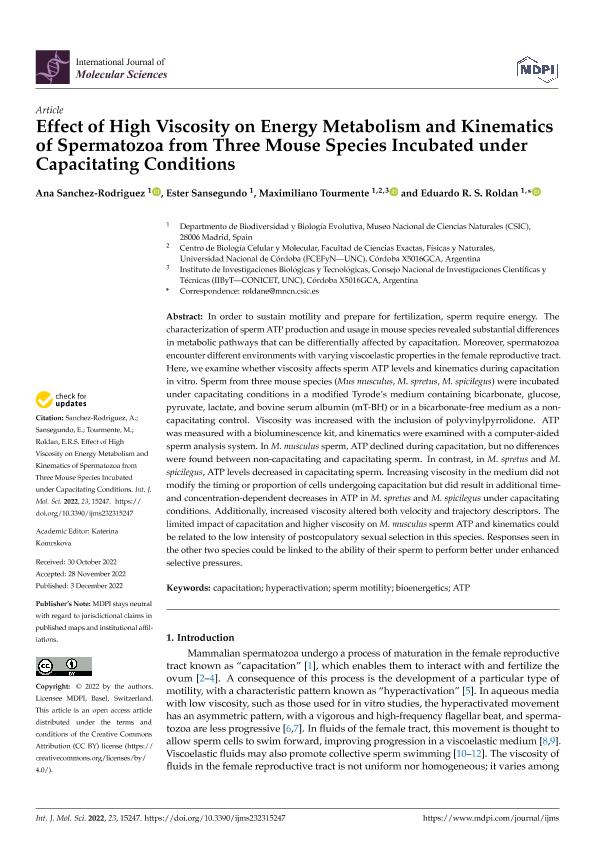Mostrar el registro sencillo del ítem
dc.contributor.author
Sánchez Rodríguez, Ana
dc.contributor.author
Sansegundo, Ester
dc.contributor.author
Tourmente, Maximiliano

dc.contributor.author
Roldan, Eduardo R. S.
dc.date.available
2023-08-24T19:06:43Z
dc.date.issued
2022-12
dc.identifier.citation
Sánchez Rodríguez, Ana; Sansegundo, Ester; Tourmente, Maximiliano; Roldan, Eduardo R. S.; Effect of High Viscosity on Energy Metabolism and Kinematics of Spermatozoa from Three Mouse Species Incubated under Capacitating Conditions; Multidisciplinary Digital Publishing Institute; International Journal of Molecular Sciences; 23; 23; 12-2022; 1-27
dc.identifier.issn
1661-6596
dc.identifier.uri
http://hdl.handle.net/11336/209299
dc.description.abstract
In order to sustain motility and prepare for fertilization, sperm require energy. The characterization of sperm ATP production and usage in mouse species revealed substantial differences in metabolic pathways that can be differentially affected by capacitation. Moreover, spermatozoa encounter different environments with varying viscoelastic properties in the female reproductive tract. Here, we examine whether viscosity affects sperm ATP levels and kinematics during capacitation in vitro. Sperm from three mouse species (Mus musculus, M. spretus, M. spicilegus) were incubated under capacitating conditions in a modified Tyrode’s medium containing bicarbonate, glucose, pyruvate, lactate, and bovine serum albumin (mT-BH) or in a bicarbonate-free medium as a non-capacitating control. Viscosity was increased with the inclusion of polyvinylpyrrolidone. ATP was measured with a bioluminescence kit, and kinematics were examined with a computer-aided sperm analysis system. In M. musculus sperm, ATP declined during capacitation, but no differences were found between non-capacitating and capacitating sperm. In contrast, in M. spretus and M. spicilegus, ATP levels decreased in capacitating sperm. Increasing viscosity in the medium did not modify the timing or proportion of cells undergoing capacitation but did result in additional time- and concentration-dependent decreases in ATP in M. spretus and M. spicilegus under capacitating conditions. Additionally, increased viscosity altered both velocity and trajectory descriptors. The limited impact of capacitation and higher viscosity on M. musculus sperm ATP and kinematics could be related to the low intensity of postcopulatory sexual selection in this species. Responses seen in the other two species could be linked to the ability of their sperm to perform better under enhanced selective pressures.
dc.format
application/pdf
dc.language.iso
eng
dc.publisher
Multidisciplinary Digital Publishing Institute
dc.rights
info:eu-repo/semantics/openAccess
dc.rights.uri
https://creativecommons.org/licenses/by/2.5/ar/
dc.subject
ATP
dc.subject
BIOENERGETICS
dc.subject
CAPACITATION
dc.subject
HYPERACTIVATION
dc.subject
SPERM MOTILITY
dc.subject.classification
Biología Celular, Microbiología

dc.subject.classification
Ciencias Biológicas

dc.subject.classification
CIENCIAS NATURALES Y EXACTAS

dc.subject.classification
Biología Reproductiva

dc.subject.classification
Ciencias Biológicas

dc.subject.classification
CIENCIAS NATURALES Y EXACTAS

dc.subject.classification
Biología

dc.subject.classification
Ciencias Biológicas

dc.subject.classification
CIENCIAS NATURALES Y EXACTAS

dc.title
Effect of High Viscosity on Energy Metabolism and Kinematics of Spermatozoa from Three Mouse Species Incubated under Capacitating Conditions
dc.type
info:eu-repo/semantics/article
dc.type
info:ar-repo/semantics/artículo
dc.type
info:eu-repo/semantics/publishedVersion
dc.date.updated
2023-07-05T15:26:07Z
dc.identifier.eissn
1422-0067
dc.journal.volume
23
dc.journal.number
23
dc.journal.pagination
1-27
dc.journal.pais
Suiza

dc.journal.ciudad
Basilea
dc.description.fil
Fil: Sánchez Rodríguez, Ana. Consejo Superior de Investigaciones Científicas. Museo Nacional de Ciencias Naturales; España
dc.description.fil
Fil: Sansegundo, Ester. Consejo Superior de Investigaciones Científicas. Museo Nacional de Ciencias Naturales; España
dc.description.fil
Fil: Tourmente, Maximiliano. Consejo Nacional de Investigaciones Científicas y Técnicas. Centro Científico Tecnológico Conicet - Córdoba. Instituto de Investigaciones Biológicas y Tecnológicas. Universidad Nacional de Córdoba. Facultad de Ciencias Exactas, Físicas y Naturales. Instituto de Investigaciones Biológicas y Tecnológicas; Argentina. Universidad Nacional de Córdoba. Facultad de Ciencias Exactas, Físicas y Naturales. Centro de Biología Celular y Molecular; Argentina. Consejo Superior de Investigaciones Científicas. Museo Nacional de Ciencias Naturales; España
dc.description.fil
Fil: Roldan, Eduardo R. S.. Consejo Superior de Investigaciones Científicas. Museo Nacional de Ciencias Naturales; España
dc.journal.title
International Journal of Molecular Sciences
dc.relation.alternativeid
info:eu-repo/semantics/altIdentifier/url/https://www.mdpi.com/1422-0067/23/23/15247
dc.relation.alternativeid
info:eu-repo/semantics/altIdentifier/doi/http://dx.doi.org/10.3390/ijms232315247
Archivos asociados
